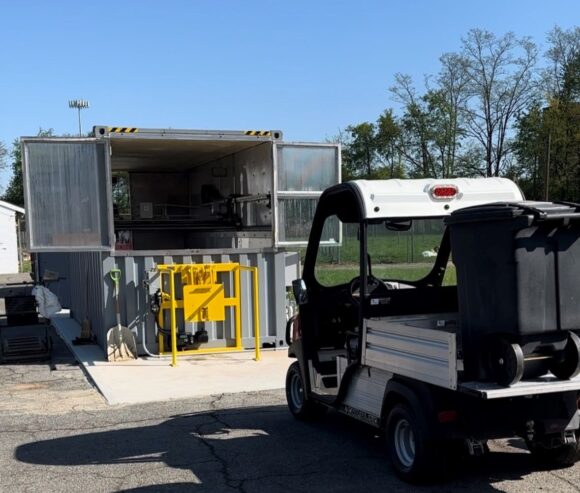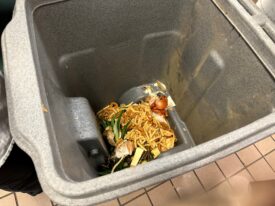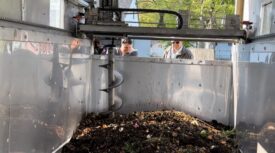
Earth Flow™ Automatic Composting System.
The program at Rutgers will be a model for other universities to follow
Rutgers EcoComplex today announced the commissioning of a new automated in-vessel composting system for the university’s Cook Campus in New Brunswick, the campus home of the School of Environmental and Biological Sciences and the New Jersey Agricultural Experiment Station.

Food Waste
The Earth Flow™ In-Vessel composting system from Green Mountain Technologies (GMT) will automatically process up to 30,000 pounds of campus compostable materials per month, including food and animal waste. This will reduce the environmental impact and financial cost of hauling waste to landfills, while creating compost to enrich campus landscapes, gardens and greenhouses.
“We’ve been exploring potential composting plans for the Cook Campus for many years. Our new Earth Flow “in-vessel” composting system from Green Mountain Technologies will help us divert our cafeteria and animal waste from landfills, which is very important for Rutgers’ sustainability and climate change mitigation strategies. In addition, this project will serve as the first step in the creation of an organic recycling and reutilization Living-Laboratory,” said Serpil Guran, director of the EcoComplex “Clean Energy Innovation Center” and project leader at Rutgers.
According to Guran, on-campus organics diversion recycling research and demonstration funding is provided by the New Jersey Department of Environmental Protection.
“Our research project will provide invaluable data on several types of composting activities. A big thanks to our collaborators including New Jersey Composting Council who will provide additional support for this composting research project,” she added.
“The New Jersey Composting Council is excited to work with the team on a pre-composting program, outreach, and compost-related research to help ensure a successful food waste and organics recycling program,” said Jairo Gonzalez, president of the New Jersey Composting Council.

Inside the Earth Flow™ Automatic Composting System.
The Earth Flow™ composting system is an “In-Vessel” compost processor first developed by Green Mountain Technologies more than 20 years ago. It automatically mixes, grinds and aerates compostable materials in an enclosed vessel similar to a shipping container. The aeration system enables the odorous exhaust to be vented into a biofilter to eliminate odors while the system is operating. Fresh compostable material is simply loaded into one end of the container, while compost is automatically ejected out the other end in a controlled process.
“We’re thrilled to provide a cutting-edge composting solution for Rutgers,” said GMT Founder Michael Bryan Brown. “The Earth Flow™ is particularly effective at odor-free processing of food waste and compostable plastics, and we believe the program at Rutgers will be a model for other universities to follow.”
About Rutgers EcoComplex
Based in Bordentown, NJ, Rutgers EcoComplex “Clean Energy Innovation Center” is one of the off-campus centers of New Jersey Agricultural Experiment Station and the School of Environmental and Biological Sciences. The EcoComplex, as a multidisciplinary clean energy innovation center, harnesses research and education resources in the development and commercialization of innovative technologies that support sustainability, climate change mitigation, circular carbon economy and social justice.
About Green Mountain Technologies
Based in Washington State, Green Mountain Technologies (GMT) was founded in 1992 to design, build and manufacture commercial composting systems for the world market. GMT is dedicated to helping forward-thinking organizations reduce their environmental footprint, save money and produce high quality compost as efficiently as possible. GMT has designed and built advanced composting systems for over 400 customers and facilities across N. America, Europe, the Middle East, Asia and Australia. The company’s comprehensive product line and proprietary technologies offer unique solutions for institutional, commercial and municipal composting facilities of all types and sizes.

